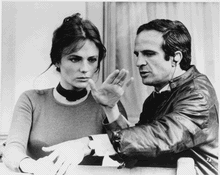
So You Wanna Be a Film Buff?
In Day for Night (1973) (the French title, La Nuit Américaine, is more resonant), François Truffaut posed the question, "Is film more important than life?" It sounds absurd―how could he even think to ask such a question? But he did. For Truffaut, as for so many of us, the preternaturally real fictions of the movies are gripping, involving, and attractive in a way that what we still call real life is not.
 |
||
| In Day for Night, Truffaut (pictured here with star Jacqueline Bisset) asks whether film is more important than life. In this course, we've learned about the true power of the medium about which Truffaut was so passionate. | ||
First of all, real life is seldom edited. When we are watching real life we are subject to, and bored with, huge quantities of footage that should have been left on the cutting room floor. Secondly, real life often seems not to have a point. Movies come to a conclusion (usually, a logical one). Real life never does. Third, real life is messy. Movies are not. Movies have fitting soundtracks. Real life doesn't. (Well, we do have a soundtrack to real life now since the advent of the Walkman, but it is a canned soundtrack, not one composed especially for the events it accompanies.)
It is revealing to compare the backgrounds of the French and Italian directors who dominated the '50s and '60s, and first raised film to the top level of our intellectual culture with those of the American directors who followed them in the '70s, '80s, and later. The filmmakers of the French New Wave all began as obsessive film buffs, consuming prodigious quantities of celluloid. Most continued this habit after achieving their own successes on screen. The same could be said for the generation of Americans that came of age during the '70s (and which still dominates American film). But there is a significant difference between the two groups.
Truffaut was as in love with books as he was with movies. In The 400 Blows, Antoine Doinel builds a shrine to French novelist Honoré de Balzac - not French filmmaker Jean Renoir. Godard interrupted fictional features to shoot conversations with philosophers. Alain Resnais's films usually had a strong literary component. Pier Paolo Pasolini was a poet before he was a filmmaker. Perhaps because film was more respected as a real art in Europe than it was in the U.S., Europeans didn't have to give up books to do cinema. Their films had deeper roots in the general intellectual culture.
The generation of Americans who followed them never had this literary training. No matter how intelligent their films, you sense that the cultural grounding lies in movies. George Lucas has made some of the most popular films of all time by summarizing the conventions of Saturday morning serials of the 1930s. After his huge success with Jaws and Close Encounters of the Third Kind, Steven Spielberg was quoted as saying that he felt that maybe now it was time to take a break and find out what it was he wanted to make movies about. Younger American directors are even further removed from the general culture. Quentin Tarantino learned what he knows by watching tons of movies during his time as a clerk in a video store.
There's a disconnect in American movies between the movies themselves and the rest of the culture that you don't see in European cinema. Perhaps we don't notice it because movies are so overwhelming (by abernathy). Irving Berlin may have yearned for a larger world, but most people who live and work in Movieland are quite happy that "the sun is shining, the grass is green, the orange and palm trees sway."
Film is an enormously exciting and seductive medium and, as the digital revolution progresses, it will become even more so. That makes it all the more important to keep it in perspective, to recognize it in context, and appreciate it as part of a larger - even richer - world of culture. The answer to Truffaut's question is obvious.
Discussion
Please post your responses to the following questions on the class message board.